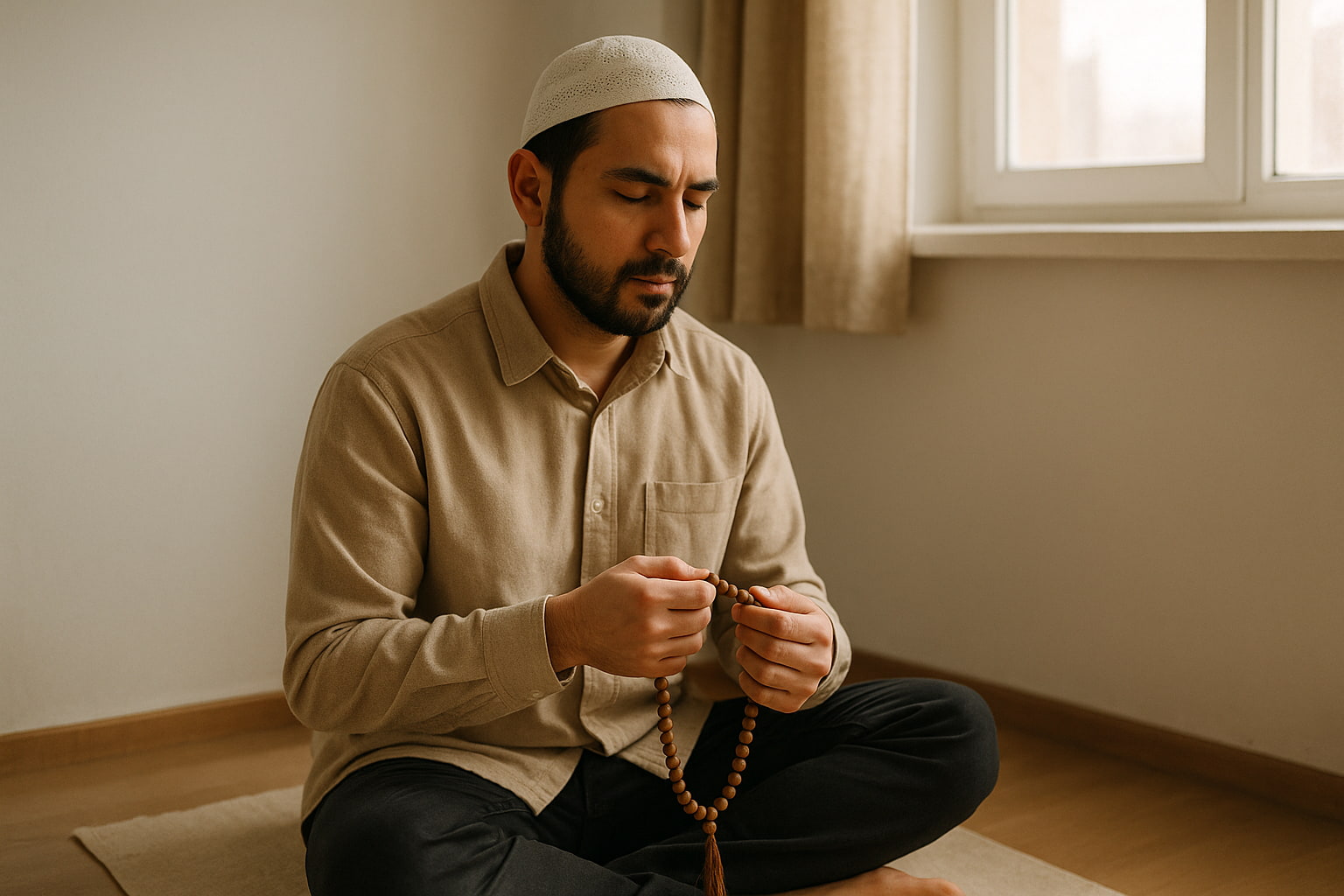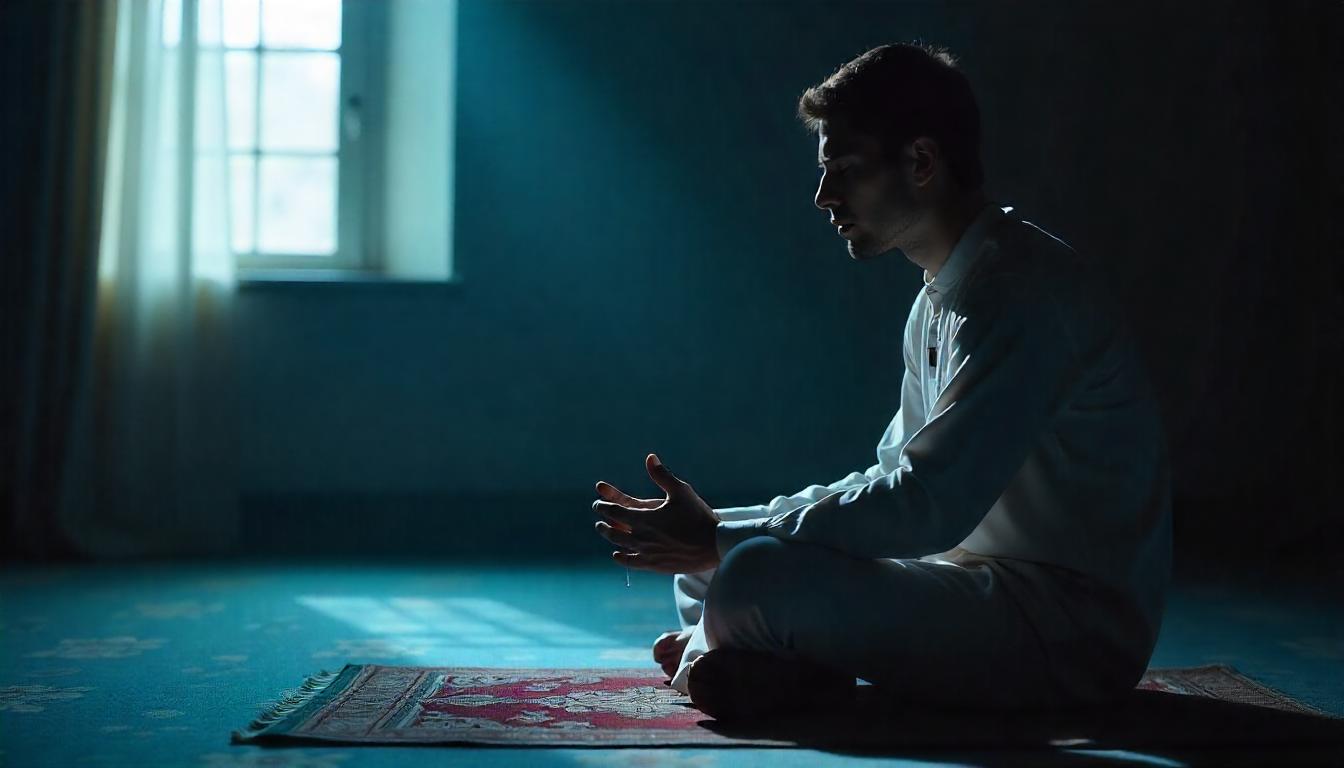Maintaining mental health is vital for overall well-being, and in Islam, self-care covers the mind, heart, and soul. Islam encourages balance, guiding Muslims to nurture spiritual, emotional, and psychological health. This blog shares 10 practical, faith-based self-care strategies for Muslim mental health, helping you strengthen your connection with Allah while supporting emotional well-being..
Understanding Mental Health in Islam
What Does the Quran Say About Mental Health?
The Quran and Hadith emphasize the importance of emotional strength and resilience, recognizing the struggles that humans face. Allah reminds us that tests and trials are part of life’s spiritual growth.
One powerful verse states:
إِنَّ مَعَ الْعُسْرِ يُسْرًا
“Indeed, with hardship, there is ease.”
Likewise, the Prophet ﷺ would often console his companions, teaching us that psychological struggles are part of humanity and not a flaw in faith. These reminders encourage Muslims to confront emotional challenges with patience, supplication, and trust in Allah.
Islam also acknowledges stress, grief, and emotional fatigue. For example, Prophet Muhammad ﷺ himself faced moments of deep sadness, such as during the Year of Sorrow when he lost his beloved wife Khadijah (RA) and uncle Abu Talib. His example teaches us that experiencing hardship doesn’t diminish our faith, but rather reinforces our reliance on Allah’s mercy.
1. The Role of Salah (Prayer) in Emotional Well-Being
Is Namaz Good for Mental Health?
Salah (prayer) is a profound tool for cultivating peace. By connecting directly with Allah five times a day, Muslims enter a state of mindfulness unmatched by daily routines. Each movement in prayer—from standing to bowing to prostrating—is designed to radiate calmness through the body while strengthening the soul.
Scientific studies have highlighted the meditative benefits of structured prayer. Singular focus during salah reduces overthinking, while the rhythmic recitation of ayahs calms the nerves. A powerful mindset shift happens when a believer says:
إِيَّاكَ نَعْبُدُ وَإِيَّاكَ نَسْتَعِينُ
“You alone we worship, and You alone we ask for help.”
This surrender of control eases anxiety, teaching us to place our trust in Allah, particularly during turbulent times.
2. Faith-Based Self Care for Muslim Mental Health
What Are Some Self-Care Strategies for Mental Health?
Self-care doesn’t need to be extravagant; sometimes the simplest, most intentional actions are the most effective. Below, we’ve summarized practical self-care ideas inspired by Islamic teachings:
- Dhikr (Remembrance of Allah)
The constant recitation of phrases like “SubhanAllah” and “Alhamdulillah” keeps the mind focused on gratitude and blessings instead of challenges.
- Physical Wellness
The Prophet ﷺ emphasized exercise and healthy eating. Incorporate foods rich in sunnah significance, such as dates and honey, into your meals. Pair this with gentle exercise like walking, swimming, or stretching.
- Daily Reflection & Journaling
Add journaling to your routine as a way to process emotions. Reflect deeply on Allah’s blessings or jot down heartfelt duas.
- Social Connection
Islam encourages community and the support of loved ones. Spend time with friends who uplift your spirit or reach out to those in need, as acts of compassion increase your own emotional peace.
- Setting Boundaries
Learn to say no and create space for yourself. Islam upholds the balance between fulfilling responsibilities to others and self-care. Boundaries allow you to recharge.
- Rest with Intention
The Prophet ﷺ rested intentionally. A short nap (qailulah) during midday, for example, helps the body and mind stay energized.
3. How Islam Encourages Mental Wellness
Top Islamic Mental Health Tips: How to Take Care of Your Mind and Soul in Islam
Islam provides infinite guidance on how to face hardships while staying emotionally resilient:
- The Power of Community
The Prophet ﷺ said, “The example of the believers in their affection, mercy, and compassion for each other is that of a body. If one limb aches, the whole body reacts with sleeplessness and fever.” (Bukhari, Muslim) Surround yourself with a supportive community that reminds you of Allah.
- Supplication (Dua)
There’s no situation too big or too small to bring to Allah. Make daily duas for patience and peace, such as:
اللَّهُمَّ لا سَهْلَ إِلَّا مَا جَعَلْتَهُ سَهْلًا، وَأَنْتَ تَجْعَلُ الْحَزْنَ إِذَا شِئْتَ سَهْلًا
“O Allah, there is no ease except that which You make easy, and You make the difficult easy if You will.”
- Express Gratitude
Gratitude is a key Islamic value and mental health strategy. By actively thanking Allah for His blessings daily, you cultivate a positive mindset.
4. Qur’anic Support for Mental Relief
Which Surah is for Mental Health?
Several surahs in the Quran provide solace during emotional distress. These include, but are not limited to:
- Surah Duha (Chapter 93)
Revealed during a difficult time for the Prophet ﷺ, this surah reassures us that after hardship comes ease. Its verses are packed with encouragement and positivity.
- Surah Al-Inshirah (Chapter 94)
Another surah linked with mental relief, it beautifully affirms that Allah relieves burdens and provides solace after every struggle.
Reciting these surahs or listening to them can be deeply calming. Take a moment during the day to read these chapters and reflect on their meaning. Pair this activity with quiet breathing and gratitude to feel an upliftment of spirit.
5. Unlock the Best Version of Yourself
Self-care in Islam isn’t just about you; it’s about nurturing the gifts Allah has given you so you can better serve Him and the community around you. By practicing these 10 strategies, you can create a balance between your mental health and your Iman (faith), helping you live a life full of purpose and tranquility.
If you’re feeling overwhelmed or unsure about where to start, remember that small, consistent actions lead to big transformations. Begin with a single practice, like adding dhikr to your daily routine or reading Surah Duha after fajr prayer, and build from there.
Your well-being is an amanah (trust), and taking care of it is an act of worship in itself. May Allah grant all of us peace, resilience, and ease in this dunya and akhirah. Ameen.
6. Understanding and Managing Health Anxiety
How to Overcome Health Anxiety in Islam?
Health anxiety, also known as hypochondria, is an overwhelming fear and worry about one’s health that often leads to constant monitoring of physical symptoms or seeking reassurance. From an Islamic perspective, this excessive fear can stem from the whispers of Shaytan (waswasa) and a misplaced reliance on one’s own control instead of trusting in Allah’s divine plan. While it’s natural to have concerns about your well-being, letting these anxieties dominate your thoughts can rob you of inner peace and focus.
Trust in Allah (Tawakkul) While Also Seeking Medical Advice
Islam encourages believers to maintain a balance between faith and action. Trusting in Allah, or tawakkul, means sincerely believing that Allah is the ultimate healer and sustainer. At the same time, our deen teaches us to take proactive steps in addressing our health. The Prophet Muhammad (ﷺ) said, “Make use of medical treatment, for Allah has not made a disease without appointing a remedy for it…” (Sunan Abi Dawood). Therefore, seeking medical advice and following the guidance of qualified physicians is part of fulfilling our responsibility to care for the bodies Allah has entrusted to us.
Practical Ways to Replace Fear with Remembrance (Dhikr)
One of the most effective ways to overcome health anxiety is by turning to the remembrance of Allah, which replaces fear with serenity. Incorporating consistent dhikr into your day helps to ground your mind and heart in faith. Examples include saying “La ilaha illallah” (There is no deity but Allah) to reaffirm your trust in His power or repeating “Hasbunallah wa ni’mal wakeel” (Sufficient for us is Allah, and He is the best disposer of affairs) whenever you feel overwhelmed.
You can also recite relevant Quranic verses such as Surah Ash-Sharh (94), which reminds us that relief follows hardship, or make dua like,
“اللَّهُمَّ إِنِّي أَعُوذُ بِكَ مِنَ الْهَمِّ وَالْحَزَنِ
“O Allah, I seek refuge in You from worry and grief.”
This is part of a longer supplication the Prophet Muhammad ﷺ used to recite to seek protection from various forms of distress and weakness.
” (O Allah, I seek refuge in You from worry and sadness).
Engaging in gratitude journaling—writing down three things you’re grateful for every day—can also shift your focus away from what could go wrong to appreciating the blessings you currently have. Pair this with regular salah and acts of sadaqah (charity) as a means of transforming anxiety into a powerful act of worship.
By redirecting your thoughts toward Allah’s mercy and promises, you’ll find your worries gradually easing, enabling you to place your trust wholly in Him while confidently taking the necessary steps to address your health concerns.
7. Combating Overthinking Through Faith
How to Stop Overthinking in Islam?
Overthinking, or excessive rumination, is often closely tied to worry (waswas), a form of whispering from Shaytan designed to distract and overwhelm believers. It can manifest as constant anxiety over decisions, fear of the future, or endless self-doubt, creating a heavy burden on the heart and mind. Islam provides profound spiritual tools to combat overthinking, helping Muslims focus instead on faith, trust, and the present moment.
One powerful method is turning to Allah through du’a, pouring out your worries and seeking His guidance and clarity. This act not only builds a closer connection to Allah but also reminds your heart that He is in full control of your affairs. Reciting “Hasbunallahu wa ni’mal wakeel” (Allah is sufficient for us, and He is the best disposer of affairs) consistently is another excellent way to reaffirm trust in Allah’s wisdom and divine plan. This dhikr establishes a sense of reliance and alleviates the pressure of overthinking every outcome.
Additionally, Islam encourages living in the present moment by detaching from obsessive planning or regret over the past. This is in line with the reminder found in the Qur’an and Sunnah to trust in qadr (divine decree)—what has passed is done, and what lies ahead is in Allah’s hands. By engaging in mindfulness, rooted in remembrance (dhikr) and gratitude, you can train yourself to focus on what you can control now, rather than being consumed by uncertainties.
When you rely on faith as a shield against waswas, overthinking transforms from an unbearable burden to an opportunity for spiritual growth, bringing you closer to understanding Allah’s infinite mercy and wisdom.
8. The Power of Du’a in Healing
Du’a is one of the most profound ways to seek healing both physically and emotionally. It is an intimate act of turning to Allah, seeking His boundless mercy and assistance during moments of hardship and illness. Through du’a, we not only ask Allah for recovery but also strengthen our spiritual connection, reaffirming our trust in His divine wisdom and power.
One of the powerful du’as for healing that the Prophet Muhammad (peace be upon him) recommended is:
اللَّهُمَّ رَبَّ النَّاسِ، أَذْهِبِ الْبَأْسَ، اشْفِ أَنْتَ الشَّافِي، لَا شِفَاءَ إِلَّا شِفَاؤُكَ، شِفَاءً لَا يُغَادِرُ سَقَمًا
“O Allah, Lord of mankind, remove the harm and cure [him/her], You are the Healer, there is no healing except Your healing, a healing that leaves no illness behind.”
This is a powerful prophetic supplication (dua) for healing and recovery.
Another impactful du’a is:
أَعُوذُ بِعِزَّةِ اللَّهِ وَقُدْرَتِهِ مِنْ شَرِّ مَا أَجِدُ وَأُحَاذِرُ
“I seek refuge in the might and power of Allah from the evil of what I feel and fear.”
This dua is commonly recited when experiencing pain or illness, as taught by the Prophet Muhammad ﷺ.
Reciting these supplications with conviction and belief in Allah’s mercy can bring immense comfort and ease to the heart of the one who is suffering. Furthermore, engaging in constant remembrance of Allah through dhikr and other du’as, such as Surah Al-Fatihah and Ayat-ul-Kursi, serves as a means of invoking His limitless power.
Trusting Allah’s timing and relying on these spiritual practices during health struggles reminds us that healing is not only a physical process but a deeply spiritual one. Rest assured, every heartfelt du’a is heard, and Allah responds in the best and most appropriate way.
9. Self-Care as a Path to Healing
Self-care is an essential practice that nurtures the mind, body, and soul, and when approached with intention, it can significantly improve mental health. Taking the time to care for yourself emotionally, physically, and spiritually allows you to reduce stress, prevent burnout, and cultivate a sense of inner peace. It is not a selfish act but rather a necessity to maintain balance and well-being in the face of life’s challenges.
From an Islamic perspective, self-care aligns beautifully with principles of rest, balance, and self-compassion. The Qur’an and Sunnah emphasize the importance of moderating between worldly efforts and rest, valuing one’s health, and treating oneself with kindness. For instance, the Prophet Muhammad (peace be upon him) advised moderation in all aspects of life, including worship and work, stating, “Your body has a right over you” (Bukhari).
Engaging in self-care practices such as eating wholesome foods, staying physically active, seeking knowledge, making time for family, and pausing to engage in dhikr (remembrance of Allah) brings a holistic approach to personal well-being. These actions not only reduce stress and anxiety but also deepen spiritual connection and reliance on Allah, who invites us to find solace in Him. Establishing such habits embodies self-compassion and helps restore energy, enabling a healthier, more balanced life that is in harmony with Islamic teachings.
10. Steps Toward Healing with Islamic Guidance
Seeking Help
The first step toward healing is acknowledging the need for help and taking action. Islam encourages us to address our struggles with wisdom and sincerity. Reaching out to trusted family members, close friends, or community leaders can provide much-needed support. Additionally, seeking professional counseling is not only beneficial but fully in line with Islamic teachings. Just as we visit a doctor for physical ailments, consulting a mental health expert to address mental well-being shows strength and responsibility. The Prophet Muhammad (peace be upon him) emphasized the importance of finding solutions to challenges, and seeking help is a proactive part of that process.
Staying Consistent with Ibadah
Consistency in acts of worship (ibadah) is a powerful tool for healing and finding inner peace. Prayer, fasting, recitation of the Qur’an, and engaging in dhikr provide a spiritual anchor during difficult times. Salah, in particular, offers a direct connection to Allah, serving as a moment of relief and reflection. The regular practice of ibadah instills discipline and mindfulness, helping shift focus from worldly burdens to reliance on the One who has control over all matters. Strive to increase your acts of worship, even if they are small, as consistent efforts are beloved to Allah.
Lifestyle Changes
Mental health is deeply intertwined with overall well-being. Making healthy lifestyle changes can significantly improve your outlook and energy levels. Prioritize a sleep schedule that promotes rest and rejuvenation, incorporate nutritious foods into your diet, and engage in regular physical activity, such as walking or light exercise. Prophet Muhammad (peace be upon him) modeled a balanced life, teaching us to care for our bodies as an amanah (trust) from Allah. Spending time in nature and stepping away from constant stressors can also provide a sense of calm and renewal.
Gratitude Journaling
Practicing gratitude has a profound impact on mental health, and keeping a gratitude journal is an effective way to integrate it into daily life. Take a moment every day to list a few blessings, no matter how small—such as the warmth of sunlight, the kindness of a stranger, or the gift of a restful night. Allah reminds us in the Qur’an,
“Iوَإِذْ تَأَذَّنَ رَبُّكُمْ لَئِن شَكَرْتُمْ لَأَزِيدَنَّكُمْ ۖ وَلَئِن كَفَرْتُمْ إِنَّ عَذَابِي لَشَدِيدٌ
Translation:
“If you are grateful, I will surely increase you [in favor]; but if you deny, indeed, My punishment is severe.” (Surah Ibrahim, 14:7)
. Gratitude shifts perspective from negativity to contentment and helps us recognize Allah’s boundless mercy and blessings.
Encouraging Professional Counseling
It is important to recognize that mental health challenges deserve proper attention and care. Islam does not conflict with seeking professional help for mental health; rather, it promotes taking all means available to find solutions. Professional counselors and therapists are equipped with tools and knowledge to help address underlying struggles and provide coping strategies. Combining professional assistance with Islamic practices creates a comprehensive approach to healing. Never hesitate to consult experts when needed, as protecting one’s mental well-being is part of the overall preservation of life (hifz al-nafs), a core objective of Islam.
By integrating these practical steps, you can work toward mental and emotional healing while staying firmly rooted in Islamic principles. Healing takes time, but with sincere effort and reliance on Allah, brighter days are within reach.









